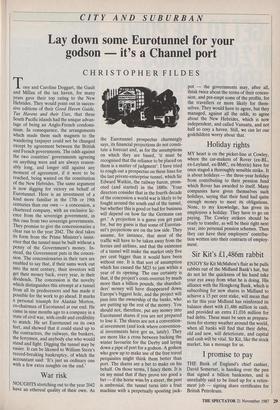War risk
NOUGHTS stretching out to the year 2042 have an ethereal quality of their own. As the Eurotunnel prospectus charmingly says, its financial projections do not consti- tute a forecast and, as for the assumptions on which they are based, 'it must be recognised that the reliance to be placed on them is a matter of judgment'. I have tried to rough out a prospectus on these lines for the last private-enterprise tunnel, which Sir Edward Watkin, the railway baron, prom- oted (and started) in the 1880s: 'Your directors consider that in the fourth decade of the concession a world war is likely to be fought around the south end of the tunnel, but whether this is good or bad for business will depend on how far the Germans can get.' A projection is a guess you get paid for, but my guess is that some of Eurotun- nel's projections are on the low side. They assume, for instance, that most of the traffic will have to be taken away from the ferries and airlines, and that the existence of a tunnel will make the market only five per cent bigger than it would have been without one. It is that sort of assumption which has caused the M25 to jam within a year of its opening. The one certainty is that, if the project's costs overrun by much more than a billion pounds, the sharehol- ders' money will have disappeared down Europe's biggest hole, and the project will pass into the ownership of the banks, who are putting up the rest of the money. You should not, therefore, put any money into Eurotunnel shares if you are not prepared to lose it. The shares are not a convention- al investment (and look where convention- al investments have got us, lately). They are more like a cross between backing the winter favourite for the Derby and laying down a pipe of port for a godson. A godson who grew up to make use of the free travel perquisites might think them better than port. The shares are a bet to make on his behalf. On those terms, I fancy them. It is on my mind that if they prove too good a bet — if the horse wins by a street, the port is ambrosial, the tunnel turns into a fruit machine with a perpetually spouting jack- pot — the governments may, after all, think twice about the terms of their conces- sion, and pre-empt some of the profits, for the travellers or more likely for them- selves. They would have to agree, but they managed, against all the odds, to agree about the New Hebrides, which is now independent, and called Vanuatu, and not half so cosy a haven. Still, we can let our godchildren worry about that.


































































 Previous page
Previous page